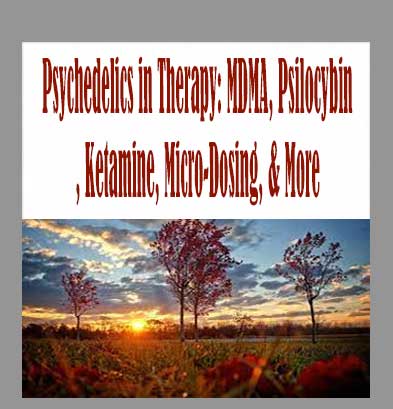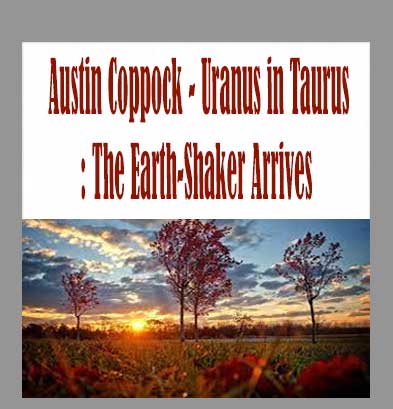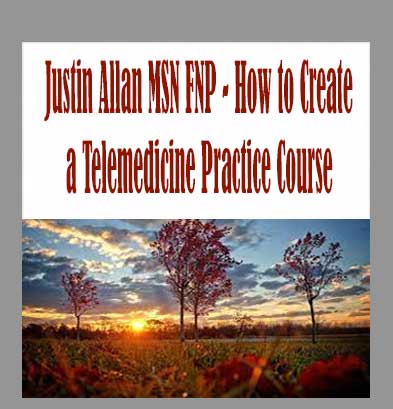
Description
Psychedelics in Therapy: MDMA, Psilocybin, Ketamine, Micro-Dosing, & More download , Psychedelics in Therapy: MDMA, Psilocybin, Ketamine, Micro-Dosing, & More review , Psychedelics in Therapy: MDMA, Psilocybin, Ketamine, Micro-Dosing, & More free
Psychedelics in Therapy: MDMA, Psilocybin, Ketamine, Micro-Dosing, & More
It’s the most compelling topic in psychotherapy today… and one of the biggest breakthroughs our field has ever seen!
With medicinal psychedelic substances becoming more available throughout the country, Psychedelic-Assisted Psychotherapy (PAP) is poised to change the landscape of therapy as we know it.
Many clients are already asking their therapists about psychedelics, and some are even exploring them on their own.
So, whether you choose to directly incorporate PAP into your practice or not, it’s critical that you know enough about this topic to guide your clients in integrating psychedelic-assisted experiences in their daily lives.
That’s why we’re partnering with the faculty at Fluence, one of the leading organizations for Psychedelic-Assisted Psychotherapy training and research…
…to offer this exclusive online course that provides in-depth insight into the most common medicinal psychedelic substances (including MDMA, Ketamine, Ayahuasca, and more)… in simple, easy-to-comprehend language, so you’ll know exactly how to speak to your clients about this topic.
You’ll also hear from therapy leaders Dick Schwartz, Gabor Maté, and others as they share their unique, personal perspectives on what we as therapists need to know to effectively work in this developing therapeutic area.
What You’ll Learn
This training is uniquely designed to provide the skills and insight so you’ll:
- Know exactly how to talk to clients about psychedelics and their use for PTSD and other mental health concerns
- Get the most up-to-date training on each of the most widely used substances including MDMA, Ketamine, Psilocybin, and Ayahuasca
- Be able to help clients TODAY who are using or micro-dosing on their own
- Know the best paths to go forward if you want to become more involved in psychedelic-assisted therapies
Psychedelics in Therapy Training Outline:
Psychedelic Harm Reduction and Integration in Clinical Practice
What do you do when a client lets you know they’re going to use psychedelics on their own? Is there anything you can do to help reduce harm? And what about micro-dosing, which is gaining popularity? This presentation will provide essential information and guidance on how to have these important conversations — including discussions about microdosing, responding to requests for referrals to non-licensed providers, and working with difficult experiences.
Evidence-Based Therapy Practices in Psilocybin-Assisted Interventions
This workshop will explore modern approaches to psychotherapy using the classic psychedelic compound, psilocybin. This includes a variety of disorders such as substance use, affective, and anxiety disorders. Methods for assuring safety as well as maximizing efficacy will be covered.
MDMA-Assisted Therapy in the Treatment of Post-traumatic Stress Disorder
Early trial studies show that MDMA has incredible potential to treat PTSD and can even eliminate the diagnosis altogether! With a second trial study nearing completion and the possibility of MDMA becoming an available treatment in the near future, now is your opportunity to get a full and up-to-date understanding of MDMA-assisted psychotherapy for your practice.
New Models for Ketamine-Assisted Psychotherapy
Ketamine is an FDA-approved medication that has been used for anesthesia and pain relief in adults and children for many years. However, it has also been researched and used for the treatment of depression, post-traumatic stress disorder, and other “treatment resistant” mental health disorders — with promising results. As Ketamine-Assisted Psychotherapy gets closer to becoming available for mental health therapists, this is your opportunity to get the latest insights on this developing healing opportunity.
An Introduction to Ayahuasca for Mental Health Providers
Ayahuasca is one of the most popular and least understood psychedelic agents. In this talk, we’ll cover an introduction to ayahuasca, including biochemical, neuroscientific, and historical/cultural aspects of its use. Following this, we’ll cover contemporary research on its effects on mental health and its use for the treatment of conditions such as addiction and depression. Lastly, some of the psychodynamic aspects of shamanic and syncretic religious settings will be described.
When Psychedelics Hurt: Unpleasant Psychedelic Experiences as a Pathway to Healing
Not all experiences with psychedelics feel good. In fact, it’s common for people to experience some level of distress, and without proper guidance, these unpleasant journeys can leave people feeling less integrated than they were before. In this dynamic conversation, Gabor Maté, MD, will present from research and his own extensive experience, ways to reduce the likelihood of harm from psychedelic use, and how unpleasant experiences can be transformed into deeply meaningful and healing experiences.
Psychedelic-Assisted Psychotherapies: A Policy Perspective
In anticipation of FDA approval and medicalization, clinicians everywhere are eager to learn more about Psychedelic-Assisted Psychotherapy. But many questions remain unanswered around the current policy landscape and the changes needed to welcome these medicines into our current healthcare system and in psychotherapy. This presentation will provide you with an overview of the history and current state of psychedelic policy and look ahead to what the future holds for clinicians like you to practice psychedelic-assisted therapy.
The Fantastic Effects of Ketamine Assisted Psychotherapy: A Revolution in Clinical Practice
Ketamine has been used legally for depression, anxiety, and a host of other mental health conditions. This presentation reviews the key elements of integration strategies specific to the mental health condition being addressed. There are specific nuances of Ketamine treatment that will beoutlined and compared to other psychedelics.
Psychedelics & Racial Justice
Psychedelics have been studied for the treatment of PTSD, depression, end-of-life anxiety, OCD, addictions, and a number of other mental health conditions. However, research studies of psychedelic psychotherapies have largely excluded people of color, leaving important questions unaddressed for these populations. Dr. Williams will review relevant research, documenting exclusion based on the international literature. She will discuss ethnic minority mental health and how psychedelic therapies may help or hinder healing for people of color. Also discussed are the next steps in ensuring that access to culturally-informed care is prioritized as several psychedelics move into late-phase trials and expanded access, including the importance of culturally-informed approaches and training focused on therapy providers of color.
The Internal Family Systems Approach to Psychedelic Experiences
The psyche is a delicate ecosystem and psychedelics are powerful agents that can profoundly affect it. While that effect can be positive, there is also the potential for extreme disruption. That’s where Internal Family Systems (IFS) can help therapists and clients alike maintain a steady presence and not overreact to sometimes dramatic shifts. In this talk, IFS founder Dick Schwartz will address the probable risks and benefits of incorporating psychedelics in the therapy room.
Meet Your Course Experts
Richard Schwartz, PhD, is the founder of the Internal Family Systems (IFS) therapy model. He now serves on the Faculty of the Department of Psychiatry at Harvard Medical School and is a Senior Fellow at the Meadows treatment center in Arizona. In 2000, he founded the Center for Self Leadership (now IFS Institute), which offers three levels of training and workshops in IFS for professionals and the general public, both in this U.S. and abroad. A featured speaker for national professional organizations, Dr. Schwartz has published many books and over fifty articles about IFS.
Gabor Maté, MD, is a renowned speaker and bestselling author. He is highly sought after for his expertise on a range of topics including trauma treatment, addiction, stress, and childhood development. As an author, Dr. Maté has written several bestselling books including the award-winning In the Realm of Hungry Ghosts: Close Encounters with Addiction; When the Body Says No; The Cost of Hidden Stress; and Scattered Minds: A New Look at the Origins and Healing of Attention Deficit Disorder, as well as the newly released The Myth of Normal.
Dr. Elizabeth Nielson is a co-founder of Fluence and a psychologist with a focus on developing psychedelic medicines as empirically supported treatments for PTSD, substance use problems, and mood disorders.
Dr. Ingmar Gorman is a co-founder of Fluence, a psychedelic education company training mental health providers in psychedelic treatments. As a psychologist, he shares his expertise in empirically supported psychedelic treatments with his clients and trainees alike.
Seema Desai, MD, is a board-certified child, adolescent, and adult psychiatrist with a clinical interest in the intersection of spirituality and psychiatry. She is currently a study therapist in a MAPS trial examining the effects of MDMA for the treatment of PTSD. She offers psychopharmacology treatment and ketamine-assisted psychotherapy in her private practice.
Jeffrey Guss, MD, is a psychiatrist, psychoanalyst, and researcher with specializations in psychoanalytic therapy, addictions, and psychedelic therapy. He was Co-Principal Investigator and Director of Psychedelic Therapy Training for the NYU School of Medicine’s study on psilocybin-assisted psychotherapy in the treatment of cancer-related existential distress, and is currently a study therapist on studies of Psilocybin-Assisted treatment of Major Depressive Disorder and MDMA-Assisted Psychotherapy for PTSD.
Matthew Johnson, PhD, is The Susan Hill Ward Endowed Professor of Psychedelics and Consciousness Research at Johns Hopkins. Working with psychedelics since 2004, he is one of the world’s most widely published experts on psychedelics. He has published research on psychedelics and mystical experiences, personality change, tobacco smoking cessation, cancer distress treatment, and depression treatment. In 2021 he received, as principal investigator, the first grant in 50 years from the US government for a treatment study with a classic psychedelic, specifically psilocybin in the treatment of tobacco addiction. He is also known for his expertise in behavioral economics, addiction, sexual risk behavior, and research with a wide variety of drug classes.
Victor Cabral, MSW, LSW, CCTP-I, is the Founder of Dreamers of the Day LLC. and serves as the Director of Policy and Regulatory Affairs for Fluence International Inc., a company that provides evidence-based training in psychedelic therapy and integration services to clinicians across the globe.
Phil Wolfson, MD, is president and CEO of the non-profit Ketamine Research Foundation and directs the training of KAP practitioners through The Ketamine Training Center. Phil’s book, The Ketamine Papers, is the seminal work in the burgeoning ketamine arena. He is principal investigator for the MAPS-sponsored Phase 2, the FDA-approved 18-person study of MDMA-Assisted Psychotherapy for individuals with significant anxiety due to life-threatening illnesses. His clinical practice with ketamine has informed his leadership role in the development of Ketamine-Assisted Psychotherapy.
Monnica T. Williams, PhD, is a board-certified licensed clinical psychologist who was named one of the top 25 thought leaders in PTSD by PTSD Journal. Her work has been featured in several major media outlets, including NPR, Huffington Post, CNN, and the New York Times. Dr. Williams has published over 100 book chapters and peer-reviewed articles focused on trauma and other anxiety-related disorders and cultural differences. She is currently an Associate Professor at the University of Ottawa in the School of Psychology, where she is the Canada Research Chair for Mental Health Disparities. She is also Clinical Director of the Behavioral Wellness Clinic in Connecticut, where she provides supervision and training to clinicians for empirically-supported treatments.
Frequently Asked Questions:
- Innovative Business Model:
- Embrace the reality of a genuine business! Our approach involves forming a group buy, where we collectively share the costs among members. Using these funds, we purchase sought-after courses from sale pages and make them accessible to individuals facing financial constraints. Despite potential reservations from the authors, our customers appreciate the affordability and accessibility we provide.
- The Legal Landscape: Yes and No:
- The legality of our operations falls into a gray area. While we lack explicit approval from the course authors for resale, there’s a technicality at play. When procuring the course, the author didn’t specify any restrictions on resale. This legal nuance presents both an opportunity for us and a boon for those seeking budget-friendly access.
- Quality Assurance: Unveiling the Real Deal:
- Delving into the heart of the matter – quality. Acquiring the course directly from the sale page ensures that all documents and materials are identical to those obtained through conventional means. However, our differentiator lies in going beyond personal study; we take an extra step by reselling. It’s important to note that we are not the official course providers, meaning certain premium services aren’t included in our package:
- No coaching calls or scheduled sessions with the author.
- No access to the author’s private Facebook group or web portal.
- No entry to the author’s exclusive membership forum.
- No direct email support from the author or their team.
We operate independently, aiming to bridge the affordability gap without the additional services offered by official course channels. Your understanding of our unique approach is greatly appreciated.
- Delving into the heart of the matter – quality. Acquiring the course directly from the sale page ensures that all documents and materials are identical to those obtained through conventional means. However, our differentiator lies in going beyond personal study; we take an extra step by reselling. It’s important to note that we are not the official course providers, meaning certain premium services aren’t included in our package:
Refund is acceptable:
- Firstly, item is not as explained
- Secondly, Item do not work the way it should.
- Thirdly, and most importantly, support extension can not be used.
Thank you for choosing us! We’re so happy that you feel comfortable enough with us to forward your business here.








Reviews
There are no reviews yet.